FAQs
Page updated on: 30/10/2024
The vast majority of dog owners are responsible and caring; however a small minority do not always behave responsibly. Feedback from local residents has consistently raised the issue of dog fouling and nuisance behaviour from dogs that are not under proper control.
The adoption of this order makes it easier for the authority to deal quickly and efficiently with the small minority of dog owners who behave irresponsibly, while at the same time encouraging a culture of responsible dog ownership.
This order, along with our ongoing clean-up campaign, will bring a number of benefits, including the creation of a cleaner environment, reduction of health problems associated with dog faeces and the promotion of responsible dog ownership.
It represents a modern and effective way of enforcement when required and provide a common sense method of dealing with an issue of constant concern for our residents.
We believe that the Public Spaces Protection Order is a fair, balanced and proportionate response to the current problems that are experienced within the county. We believe that it is necessary and proportionate in terms of the controls that it imposes. It imposes reasonable controls that we think should apply to all dog owners except for those who we have made exempt.
The order does not apply to the normal activities of working dogs, whilst the dog is working. Therefore, we will not prosecute if we are satisfied that a dog was working at the time that when the order was breached.
For example, we will not prosecute any breaches committed by:
- Any dog being used for emergency search and rescue work.
- Any dog being used for law enforcement work.
- Any dog being used by Her Majesty’s Armed Forces.
- Any dog being used for the herding or driving of cattle or sheep.
- Any dog being lawfully used for the capture or destruction of vermin.
- Any hounds or dogs that are being lawfully used for the purposes of hunting.
If you have a dog that you use for work, the order will still apply to the dog when it is not working. For example, if you use a dog to hunt, you will still need to comply with the order when you are not hunting with it.
Dog fouling and dogs on leads by direction are county-wide offences and therefore advisory warning signs will be placed in hotspot areas.
Dog exclusion areas will have advisory signs placed at entrances to the designated areas under these orders.
The order will last for a period of three years, but it may be extended by the council in due course. There is a statutory consultation process that we have to follow if we decide to vary this order, to extend it, or to make any additional orders.
The council can also use Community Protection Notices (CPNs) to deal with Dog Control Issues. A Community Protection Notice is a legal notice that imposes conditions on the behaviour of an individual who is causing anti-social behaviour. They are intended to deal with ongoing problems or nuisances which negatively affect the community’s quality of life, by targeting the individual(s) responsible for it.
Community Protection Notices will be used to deal with any other problems on a case by case basis, enabling us to impose conditions on the behaviour of irresponsible dog owners without affecting other dog owners who do behave responsibly.
If there is evidence to show that there are other problems in the county and this approach is not working to our satisfaction, the council will be able to vary this order or make further Public Space Protection Orders at that stage to address any continuing problems.
We will no longer enforce the Dogs (Fouling of Land) Act 1996, as we will use the Public Spaces Protection Order to deal with dog fouling instead.
The existing byelaws introducing seasonal dog exclusions (from May 1 to September 30) at Cefn Sidan and Llansteffan beach and the byelaw requiring dogs to be kept on leads at all times on Llansteffan Green will remain in force.
The byelaw excluding dogs from the children’s play area at Pembrey Country Park will no longer be enforced. Dogs will still be excluded from that area, but we will enforce the PSPO instead.
In addition to the unpleasant smell and the mess created when it gets on pram wheels, wheelchairs, shoes and clothing, there is a potential health risk associated with dog faeces.
Toxocara canis is a roundworm that lives in the dog’s gut. Eggs are passed out with the faeces and can survive in the soil for up to three years. The eggs hatch into larvae which, if ingested, will enter the bloodstream. The human blood is an alien environment and the larvae will remain dormant. However, if a larva lodges in the small blood capillaries behind the eye, it can cause partial loss of vision. Although this is very rare and the body’s defences will normally destroy the larvae, cleaning up after your dog will remove the risk.
The order requires the person in charge of a dog to clean up after it immediately, if their dog defecates on any land where the order applies.
The requirement to clean up after your dog will apply to all public places in the county of Carmarthenshire. However, the owner, occupier or person in control of a public place can opt out of the order, so it will not apply to their land.
For these purposes, a "public place" means any place to which the public or any section of the public has access, on payment or otherwise, as of right or by virtue of express or implied permission.
This includes indoor areas that are used by the public.
Yes, the requirement to clean up after your dog will apply to all public land that falls within the description set out above, including areas of land in private ownership that are used by the public (or a section of the public).
However, the owner, occupier or person in control of a piece of public land can give the person in charge of a dog permission not to clean up after their dog on the land. They can give this permission to individuals, to groups of people, or to everyone that uses their land. By giving this permission to everyone, they can opt out of the order, so it will not apply to the land.
Yes, public rights of way qualify as land which is open to air and to which the public are entitled or permitted to have access.
Some footpaths go across private land, but the public have a right to be using them; therefore if your dog fouls on the route of a footpath and you fail to clean up you can be issued with a Fixed Penalty Notice.
We would advise you to always take a poop scoop or carrier bag with you when you take your dog for a walk.
You must not leave bags of dog faeces lying around, even if you intend to pick them up later. If you do so, you will be committing a criminal offence under section 87 of the Environmental Protection Act 1990 (for littering). Containers and deodorised bags can make them easier to carry.
When you are out walking your dog it is your responsibility to watch your dog at all times and to ensure you clean up after it. Being unaware of the defecation (whether by reason of not being in the vicinity or otherwise), or not having a suitable means of removing the faeces, is not a reasonable excuse for failing to comply with the order.
If your dog defecates on public land, the bagged dog waste can be placed in any public litter bin, dog waste bin or household waste bin.
Yes. This part of the order will not apply to a person who:
(a) is registered as partially sighted or blind in a register compiled under section 29 of the National Assistance Act 1948; or
(b) is registered as “sight-impaired”, “severely sight-impaired” or as “having sight and hearing impairments which, in combination, have a significant effect on their day-to-day lives”, in a register compiled under section 18 of the Social Services and Well-being (Wales) Act 2014; or
(c) has a disability which affects his mobility, manual dexterity, physical coordination, or ability to lift, carry, or otherwise move everyday objects, such that he cannot reasonably be expected to remove the faeces; or
(d) has some other disability, such that he cannot reasonably be expected to remove the faeces.
For the purposes of the order, a “disability” means a condition that qualifies as a disability for the purposes of the Equality Act 2010.
This part of the order allows people authorised by the council to issue a direction requiring the person in charge of a dog to place it on a lead of no more than two metres in length. They can only issue such a direction in limited circumstances. For further information on circumstances when a direction can be issued to put a dog on a lead, please see the question below.
For these purposes, a “lead” means any rope, cord, leash or similar item used to tether, control or restrain a dog, but does not include any such item which is not actively being used as a means of restraint so that the dog remains under a person’s close control. Therefore, if you put your dog on a leash but then fail to keep hold of it or to affix it to something suitable so that the dog remains under your close control, you will still commit an offence.
A request to put a dog on a lead can only be made where an authorised officer of the council believes that such restraint is reasonably necessary to prevent a nuisance or behaviour by the dog that is likely to cause annoyance or disturbance to any other person, or the worrying or disturbance of any animal.
You will not be required to place your dog on a lead if it is not causing or likely to cause a nuisance or annoyance to others, or the worrying or disturbance of any animal.
The direction can be given by "an authorised officer of the council". This has a wide meaning and means any person who is authorised in writing by the council for the purpose of giving directions under the order. This can include a person who is not an employee of the council, such as employees of a contractor or a partner agency.
The council recognises that the vast majority of dog owners are responsible and keep their dogs under control whilst taking them on public land. However, if they are not properly supervised and kept under control, dogs that are allowed off a lead in public areas can cause road traffic accidents, and can cause nuisance or injury to members of the public and to other animals.
Having the power to require someone to place their dog on a lead when it is causing a nuisance will give us and our partner agencies a flexible, visible tool to tackle any problems when they do occur.
The council accepts that dog owners need to be able to exercise their dogs off a lead in open spaces, for animal welfare reasons. We believe that this order strikes a fair and sensible balance. It still allows people to walk their dogs off lead in public areas, but gives us the power to deal with any problems as and when they occur, by requiring an individual to place their dog on a lead.
Yes, if you are directed to place your dog on a lead you must use a lead no more than two meters in length.
Yes you can still use and extendable lead, but you must not extend it beyond two metres if directed to place your dog on a lead of no more than 2m in length.
This part of the order will apply to all public places in the county of Carmarthenshire.
However, the owner, occupier or person in control of a public place can give the person in charge of a dog permission not to comply with the order on the land. They can give this permission to individuals, to groups of people, or to everyone that uses their land. By giving this permission to everyone they can opt out of the order, so it will not then apply to the land.
For these purposes, a "public place" means any place to which the public or any section of the public has access, on payment or otherwise, as of right or by virtue of express or implied permission.
This includes indoor areas that are used by the public.
The order excludes dogs from all outdoor, enclosed children’s play areas within Carmarthenshire, and will be enforced where the council has erected signage to say that dogs are prohibited.
A children’s play area is an area that is set aside for children to play in and contains children’s play equipment such as slides, swings, climbing frames and other similar apparatus.
This order will not apply to sites such as tennis courts, skate parks, multi ball parks, sports facilities etc.
This part of the order applies to all enclosed children’s play areas in the county of Carmarthenshire that are open to the air and will be enforced where these have been identified as areas where dogs are prohibited by appropriate signage erected by or on behalf of the council.
For these purposes, land which is covered is to be treated as land which is "open to the air" if it is open on at least one side.
The order only applies to outdoor children’s play areas that are totally enclosed on all sides by fences, gates, walls or other structures that mark the boundary of the play area. This will make it easy for people to identify the extent of the area where dogs are not allowed.
If there is a children’s play area within your local park that is separated from the rest of the park, dogs will not be allowed in to the fenced off play area. This will not stop you from taking dogs in to the rest of the park.
Where there is an unenclosed play area within a larger park site, the exclusion order will not apply to it.
Some examples are given below. Please note, that the text below each photograph indicates whether the order will apply to the area in the condition shown in the photograph. They are included as examples to explain what a “enclosed children’s play area” is, and to illustrate situations where play areas will not fall within the order. Further works may be undertaken at some of the sites shown in these photographs, to bring them within the order.
Example 1
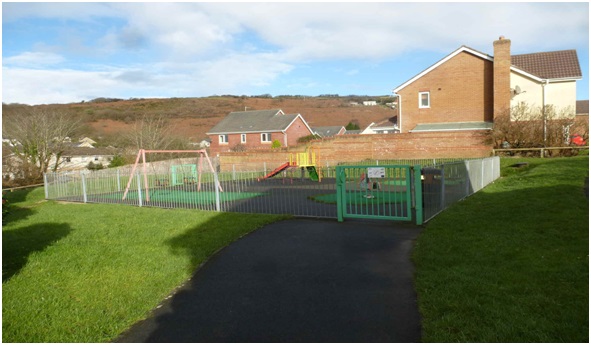
This is an enclosed children’s play area. It is totally enclosed on all sides and contains children’s play equipment. The exclusion will apply to the fenced off area, but not to the park land that surrounds it.
Example 2
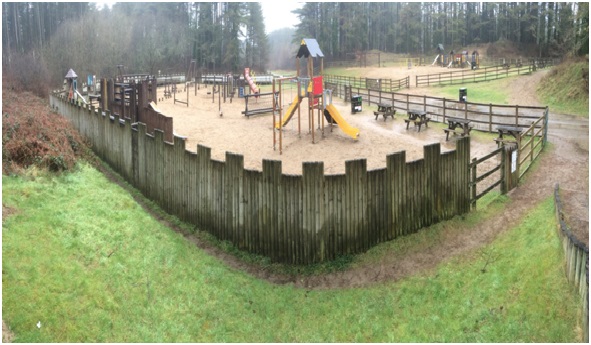
This is an enclosed children’s play area. It is enclosed on all sides and contains children’s play equipment. The exclusion will apply to the fenced off area, but not to the park land that surrounds it.
Example 3
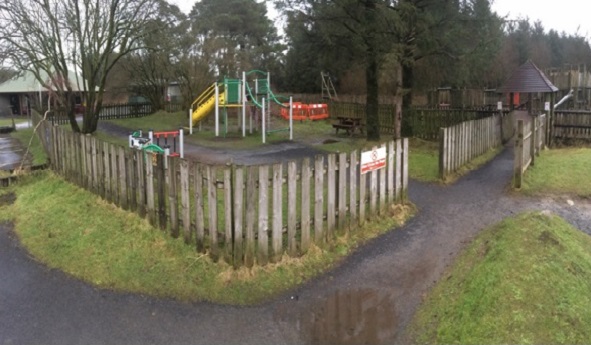
This play area has fencing around it. However as there is no gate at the entrance, it is not totally enclosed. Therefore, the exclusion will not apply to it unless gates are installed to fully enclose it.
Example 4
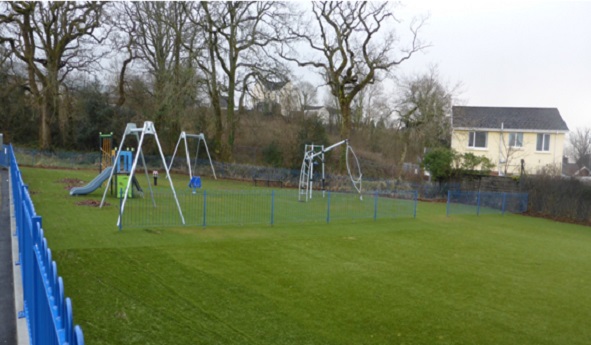
This play area has fencing and hedges around the majority of it. However, as there are missing sections of fencing it is not fully enclosed. Therefore, the exclusion will not apply to it unless further gates/fencing are installed to fully enclose it.
Example 5
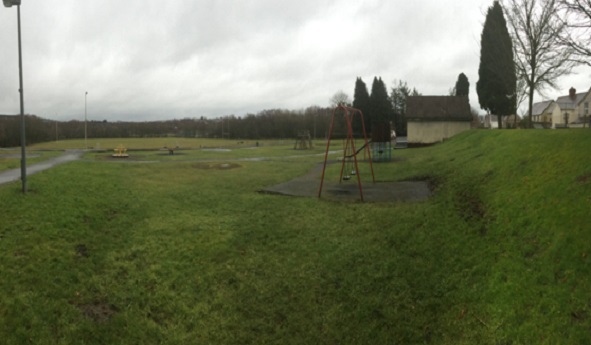
This not an enclosed children’s play area. Although it contains children’s play equipment it is an unenclosed play area within a general park. The play area is not enclosed on all sides by fences, gates, walls or other structures that mark the boundary of the play area and separate it from the rest of the park. Therefore, the exclusion will not apply to it, unless further works are undertaken to fully enclose the play area and separate it from the rest of the park.
Example 6
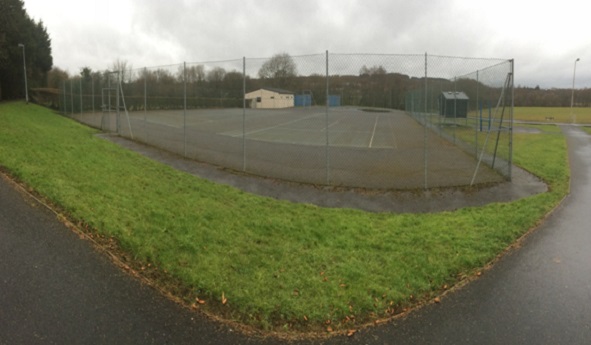
This is not an enclosed children’s play area. It is a sports facility and does not contain children’s play equipment as defined in the order. The exclusion will not therefore apply to it.
The council will erect clear signage at all of the play areas where we are enforcing the exclusion order, to notify people that dogs are prohibited from them.
We will not enforce the order at play areas where there is no such signage.
The council believes that children should be free to play on the play equipment provided in these areas without the fear of treading in or coming into contact with dog faeces. Dogs taken in to children’s play areas can also become aggressive if startled.
Yes. The dog exclusion will not apply to assistance dogs provided by a registered charity.
If the person in charge of a dog fails to comply with the requirements of the order, they will be committing a criminal offence unless:-
- they have the consent from the owner, occupier or person in charge of the land, not to comply with the order;
- they have a reasonable excuse for failing to comply; or
- they fall within one of the other exemptions within the order, such as the exemptions in the order for disabled people, assistance dogs and working dogs.
The person who normally has a dog in their possession is deemed to be in charge of the dog at any time, unless at that time of the offence, some other person is in charge of the dog.
This means that if your dog defecates in a public place or enters a children’s play area you will be responsible for it, unless you can show that somebody else was in charge of the dog at that time. If you have allowed someone else to take your dog out for a walk, they will be in charge of it for the duration of the walk.
A person who is found guilty of an offence in the magistrates court is liable on summary conviction to a fine not exceeding level three on the court’s standard scale of fines, currently £1,000.
Yes, a fixed penalty notice may be issued to a person who breaches this order, offering them an opportunity of avoid prosecution by paying a fixed penalty of £100 within 14 days.
In most cases, the council will issue a fixed penalty notice to someone who breaches the order. However, we may decide to prosecute them instead, if we consider it more appropriate to do so. For example, we may consider prosecuting someone rather than issuing a fixed penalty notice if they behave inappropriately towards our enforcement officers, or if they have previously been issued with a fixed penalty notice for similar behaviour.
The fixed penalty is £100 and we allow 14 days to pay it. We also operate an early payment scheme, which allows a reduced amount of £50 to be paid within 10 days.
If you fail to pay the fixed penalty, it is likely that you will be prosecuted in the magistrate’s court.
Our staff will be authorised to enforce the orders.
PSPO's can be enforced by officers who are authorised to do so by the council. This can include a person who is not an employee of the council, such as employees of a contractor or a partner agency.
Police Officers and Police Community Support Officers (PCSO’s) can also issue fixed penalty notices.
